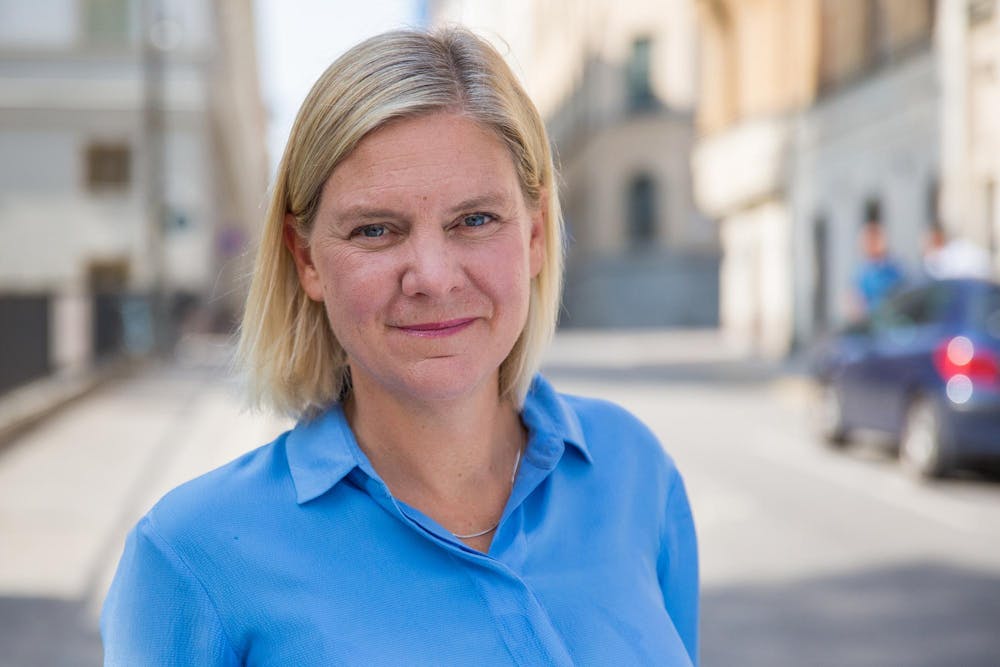Former Swedish Prime Minister and leader of the Swedish Social Democratic Party Magdalena Andersson spoke to Princeton students about geopolitics, leadership, speech, and equality on Monday, Sept. 18. Her comments reinvigorated ongoing campus discussions surrounding social media usage and concerns of infringing upon free speech.
Andersson served as the Minister for Finance of Sweden from 2014–2021 and was appointed as Prime Minister from 2021–2022. She served as the nation’s first female prime minister during the latter half of the COVID-19 pandemic and Russia’s invasion of Ukraine. Her administration is responsible for the push for Sweden and Finland to join NATO in reaction to increasing Russian pressure.
Andersson’s talk comes amid recent events from the School of Public and International Affairs, which have also highlighted diversity and inequality and discussed issues of freedom of speech and government protection.
Though her talk focused on geopolitical issues, she also touched on the role of social media on issues of free speech. She expanded on the topic in an interview with The Daily Princetonian, alluding to the role social media plays in perpetuating income, race, and gender disparities.
Andersson argued that social media algorithms encourage hate speech, and therefore social media platforms require government regulation to protect national security.
“I think the regulation of social media is not censorship of freedom of speech,” Andersson said. “Good regulation could actually be the other way around.”
She clarified in an interview with the ‘Prince’ that “the restrictions to freedom of speech are different in time and between countries,” but noted, “this makes it even more important that we continuously re-discuss where the limits should be.”
“We should think about everyday because words matter. It really matters what words you use and what you say. And we also know that if you are exposed to very crazy things that people write on social media and exposed to it again and again and again then it gets normalized,” she added.

Andersson’s comments placed her within topics of active campus debate. University President Christopher Eisgruber ’83 had discussed the impact of social media in this year’s State of the University letter. He described college students as facing a media landscape that is “flooded with the intellectual equivalent of irresistible junk food.”
“Nearly everyone now spends large amounts of time online,” Eisgruber said, adding that today’s media environment leads to not only the spread of disinformation but also contributes to causing mental health issues in young people.
“Freedom of speech doesn’t mean freedom from responsibility,” Andersson told the ‘Prince.’ “You do have a responsibility for how you’ve expressed yourself.”
This differs slightly from Eisgruber’s approach to free speech, as he has emphasized often in the past wide latitude to speakers, except in instances when individuals are unfairly or dangerously targeted.

Finally she ended with the significance of her personal identity in a position of power.
“Having role matters and I think I see it in the eyes of girls the ages of 10, 11, 12, that they see that there is a female prime minister. It matters. As it did to have a Black president or a female vice president,” she said.
Andersson was invited by The Liechtenstein Institute on Self-Determination to the University. Roughly 50 students attended the discussion, asking questions during the Q&A session which included numerous topics such as Sweden’s recent application to join NATO, crisis management, the country’s free-trade economic policies, gender inequality, and immigration.
According to their website, “The [Liechtenstein] Institute interprets self-determination broadly, subsuming the promotion of self-government, sovereignty, security, diversity, human and democratic rights, group identity, and cooperative international solutions among national, nonstate, and international actors.”
Lucas Strøbek ’26, an international student from Denmark who attended the event, told the ‘Prince’ in a written statement that Andersson’s discussion of the relationship between Sweden and NATO stuck out to him.
“Something I found interesting about Andersson’s talk was her approach to the accession of Sweden to NATO. Sweden has faced multiple hurdles concerning their accession protocol, but the former PM remained calm and focused on the long-term impact of NATO expansion,” he said.
“It was a pleasure to witness a prominent Scandinavian political figure speak at Princeton,” he added.
Rebecca Cunningham is an assistant News editor at the ‘Prince.’
Matteo Torres is a News contributor for the ‘Prince.’








